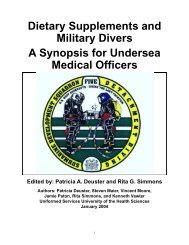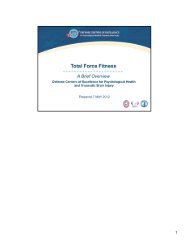Force Health Protection: Nutrition and Exercise Resource Manual
Force Health Protection: Nutrition and Exercise Resource Manual
Force Health Protection: Nutrition and Exercise Resource Manual
Create successful ePaper yourself
Turn your PDF publications into a flip-book with our unique Google optimized e-Paper software.
Water<br />
Approximately 60% of total body weight is water. Thus,<br />
adequate amounts of water must be consumed daily to ensure the<br />
normal functioning of the body <strong>and</strong> to replenish lost fluids. Water<br />
is found both inside <strong>and</strong> outside the cells of the body, but most<br />
water is inside cells, especially muscle cells. The lowest<br />
concentration of water is in bone <strong>and</strong> fat. Since muscle mass<br />
contains more water than fat, the leaner you are, the more body<br />
water you have! Water in the body serves many important roles, including:<br />
◆ Digesting <strong>and</strong> absorbing nutrients.<br />
◆ Excreting wastes.<br />
◆ Maintaining blood circulation throughout the body.<br />
◆ Maintaining body temperature.<br />
Worksheet 2-4. Calculate Your Daily Water<br />
Requirement<br />
Your Body Weight =<br />
lbs.<br />
0.5 x (body weight) ÷ 8 oz. per cup = cups per day.<br />
Note: <strong>Exercise</strong>, heat, cold, <strong>and</strong> altitude can increase fluid requirements. See Chapters 11 <strong>and</strong> 12.<br />
Maintaining Fluid Balance<br />
Fluid balance, like energy balance, is determined by the ratio of fluid<br />
losses to fluid intakes. With dehydration, water loss exceeds intake <strong>and</strong> fluid<br />
balance becomes negative. The average person loses 1,000 ml to 2,300 ml (1.0<br />
to 2.4 quarts) of water per day. This water is lost in the urine, in stools, in<br />
sweat, <strong>and</strong> through breathing. When activity levels are low, most fluids are<br />
lost through the urine. When activity levels are high or the temperature is<br />
high, most of the fluid is lost through sweat. In fact, up to 2,000 ml (2.1<br />
quarts) per hour can be lost through sweating, depending on the temperature.<br />
To maintain fluid balance you must consume enough fluids each day from:<br />
◆ Water in beverages (water, fruit juices, milk, sport drinks).<br />
◆ Water in food (fruits, vegetables, soups, meats, grains).<br />
<strong>Nutrition</strong> <strong>and</strong> <strong>Exercise</strong> <strong>Resource</strong> <strong>Manual</strong> 17




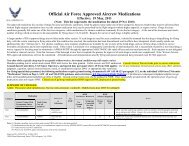

![Body Composition and Military [PDF] - Human Performance ...](https://img.yumpu.com/43269347/1/190x245/body-composition-and-military-pdf-human-performance-.jpg?quality=85)
![Tips for Grocery Shopping [PDF]](https://img.yumpu.com/37447379/1/190x245/tips-for-grocery-shopping-pdf.jpg?quality=85)
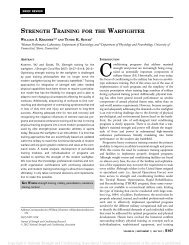
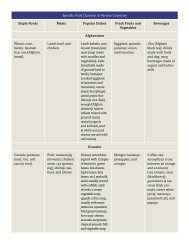
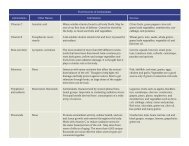
![Synthetic Drugs [PDF] - Human Performance Resource Center](https://img.yumpu.com/37447322/1/190x245/synthetic-drugs-pdf-human-performance-resource-center.jpg?quality=85)
